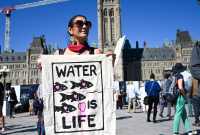Support strong Canadian climate journalism for 2025
Thousand of climate activists took to the streets of Toronto today, united in their call to end fossil fuels as the Earth's temperature rises and a new report warns of a significant increase in extreme weather across Ontario in the coming decades.
The protesters, largely led by youth, marched in downtown Toronto, brandishing signs and banners with slogans like "The Fight to End Fossil Fuels is Here", "Canada is burning. Stop fossil fuel and save our Greenbelt." They demanded immediate action from governments and corporations to combat climate change.
The demonstration was part of a global strike for climate action, with protesters of all ages converging on Queen's Park to make their voices heard.
“Fossil fuels are literally killing us,” said Mili Roy MD, Ontario regional co-chair Canadian Association of Physicians for the Environment (CAPE). “They escalate the climate crisis, now recognized as the single greatest human health crisis of our time, and also create lethal air pollution which kills over 15,000 Canadians prematurely every year.”
The only livable way forward for a sustainable thriving future must be fossil free, she added.
Despite growing consensus on the need to shift away from fossil fuels, powerful fossil fuel companies continue to prioritize profits over the planet's well-being, a joint statement from rally organizers stated.
This summer, Canada faced record-breaking wildfires that blanketed Toronto in smoke, causing the city's air quality to rank among the worst in the world on June 28th. The alarming scenes underscored the urgent need for a rapid and equitable transition away from fossil fuels, which are responsible for over 80 percent of greenhouse gas emissions driving climate breakdown, the statement added.
“This march to end fossil fuels is about people rising up to say: we will not let fossil fuel executives and bankers burn everything we love to the ground," said Allie Rougeot, environmental advocate and a co- organizer of the rally. “Our homes, our health and our loved ones are under attack - and on September 16th, we are fighting back.”
Rougeot told Canada’s National Observer people have witnessed the devastating effects of climate chaos firsthand and they can no longer afford to ignore it or hope it will simply pass. “It's becoming increasingly evident that this is a long-term challenge we must confront, whether we choose to address it or let it continue to disrupt our lives,” she added.
A newly released climate change report commissioned by Ontario’s Ford government warns by the 2080s, southern, central and eastern Ontario are expected to witness an increase in the number of extreme heat days, with temperatures soaring over 30 C. The projection ranges from 55 to 60 such extreme heat days per year, nearly four times the current average of approximately 16 days. Even northern Ontario, which currently experiences around four extreme heat days annually, could see a significant rise to more than 35 such days each year.
The report underscores that the increase in the number of extreme heat days will severely impact vulnerable groups, such as the elderly, children, those with pre-existing health conditions and Indigenous populations who are at higher risk during extreme weather events. Without adequate measures in place, these populations are likely to face serious health risks, according to the report.
“The struggle for the planet has become personal,” said Lyba Spring, co-chair of Seniors for Climate Action Now. “ Choking on wildfire smoke far from the burning forest, I think of my grandchildren and the holy mess we are leaving them. At 75, I am still prepared to fight.”
Spring told Canada’s National Observer Canada possesses the tools to halt the planet's warming like solar panels, wind power, and various sources of sustainable energy. “Unfortunately, our governments are still heavily committed to big oil and gas companies, aligning themselves with these corporations rather than prioritizing the well-being of the citizens and residents of this country.”
This story was produced in partnership with Journalists for Human Rights for the Afghan Journalists-in-Residence program funded by the Meta Journalism Project.






Comments